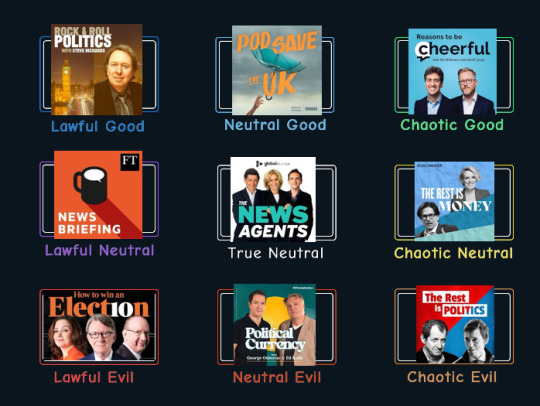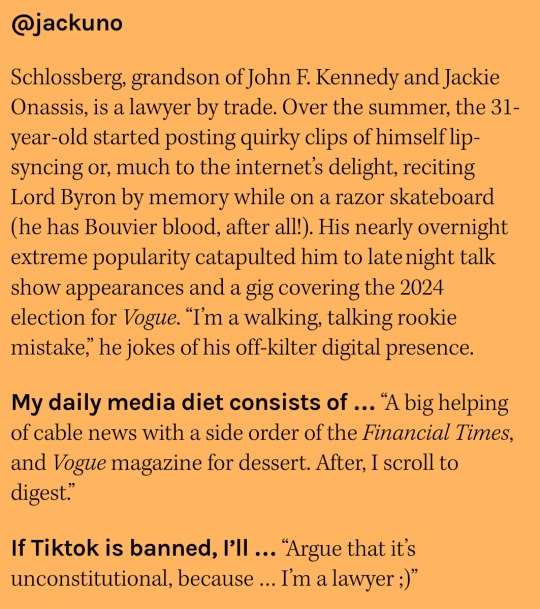#Financial times
Explore tagged Tumblr posts
Photo

fka twigs in issey miyake fw06 stamped leather breastplate and panconesi boa earrings for financial times by jordan hemingway
#fka twigs#jordan hemingway#financial times#fashion#editorial#photography#style#goth#issey miyake#panconesi#2024
1K notes
·
View notes
Text

Greta Hofer photographed by Jeremy Everett for Financial Times - HTSI Magazine December 2024
#financial times#htsi magazine#khaite#leather trench coat#fashion photography#fashion editorial#minimal fashion#editorial#fashion#style#fashion magazine
271 notes
·
View notes
Text


Yar Aguer by Felix Cooper for Financial Times HTSI December 2024
#yar aguer#felix cooper#editorial#fashion#how to spend it#financial times#htsi#fashion editorial#beauty
245 notes
·
View notes
Text

Louis Fratino | © Alex Lockett | Financial Times
128 notes
·
View notes
Text
If you somehow needed a reminder that we live in a completely fucked up world..

Fourteen of the sixteen electronic components are made by American companies. The rest are Swiss, Chinese, Malaysian and Taiwanese. China imports all this.
#ukraine#russia#financial times#america#west#europe#germany#united kingdom#great britain#russian invasion of ukraine#russia is a terrorist state#missile#colonialism#imperialism#genocide#war crimes#україна#укртумбочка#укртамблер#укртумба#usa#americans
149 notes
·
View notes
Text

Ed Luce: It is not just Donald Trump who dodged a bullet. Half an inch to the left and the cartridge that grazed Trump’s ear would have turned him into a martyr. There is no telling what his death would have unleashed. As it is, the reprehensible attempted assassination of Trump will have profound reverberations for US democracy. Within seconds of being blanketed by secret service agents, Trump was yelling “fight, fight, fight” to the crowd. The instantly ubiquitous photo of him pumping his fist against the backdrop of the stars and stripes will become the emblem of his campaign.
A high-trust society would have awaited the facts of the shooting before leaping to conclusions. By that yardstick, America is close to the edge. Two of the Republicans auditioning to be Trump’s vice-presidential running mate blamed Democrats for inciting hatred of Trump. The favourite, Ohio senator JD Vance, said the Biden campaign’s rhetoric “led directly to President Trump’s attempted assassination”. Tim Scott, the South Carolina senator, said Democrats’ “inflammatory rhetoric puts lives at risk”. Elon Musk, owner of the site, X, on which these statements were posted, was quick to weigh in on a conspiracy about how the shooter could have got so close: “Either extreme incompetence or it was deliberate,” Musk wrote.
Many on the left were equally quick to claim that the shooting was a staged or false flag operation to boost Trump’s election prospects. It is notable, however, that no senior Democratic official has yet fanned those rumours. The identity of the suspected shooter, a 20-year-old man called Thomas Matthew Crooks, offered little help. Though he was a registered Republican and an enthusiastic gun owner, he had made a small donation to a pro-Democratic group. It is plausible that like most US assassins, Crooks was acting alone and delusional. That will not stop political entrepreneurs from blaming the shooting on their ideological enemies.
The biggest question is what Trump will do with it. No honest accounting of America’s fetid climate can ignore the fact that the former president himself is the country’s most influential exponent of political violence. He described those who stormed Capitol Hill with knives and nooses on January 6 2021 as “unbelievable patriots”. He mocked an attack on Paul Pelosi, husband of former Democratic speaker, Nancy Pelosi, after one of his own supporters smashed his head with a hammer. And he encouraged extremist militias to “stand by” shortly before the 2020 election. In calmer democracies, an incident as lethal as the near murder of a party leader with a AR-15-type semi-automatic rifle would lead to bipartisan calls for gun control. There is no chance Trump’s party will change its mind on that subject. The number of AR-15s in America has been estimated to be as high as 44mn, which puts comparisons with earlier periods of US political violence into perspective.
Whether Trump gets a lasting sympathy boost remains to be seen. But three conclusions can already be drawn. The first is that the Republican national convention in Milwaukee this week will be dominated by his near miss. Trump’s campaign is enormously skilled at choreographing optics to enhance his message. The iconic fist-pumping imagery of the candidate rising courageously from his near death will suffuse the convention stage. Trump is expected to name his running mate in the next two days — probably on Monday. Expect the nation to be riveted by admiration or dread at the use to which Republicans put Trump’s near martyrdom. At Trump’s first presidential convention in Cleveland in 2016, the streets around the main hall teemed with private militias brandishing arms. Policing the streets of Milwaukee this week will be an unusually fraught challenge, even by America’s standards.
[Financial Times]
96 notes
·
View notes
Text

Here's how climate change is redrawing Europe’s wine map !
'Ten years ago, you would never see a Danish wine on the list,' says Paul Robineau, executive head sommelier for the Taillevent group. 'But, with the climate changing, Denmark is on its way to make great wines.'
Courtesy: Financial Times
#human rights#humanity#equal rights#climate crisis#climate catastrophe#climate action#climate change#global warming#climate justice#environment#pollution#human footprint#rioja#wine#winelover#red wine#europe#map#winery#sustainableliving#sustainablefarming#sustainability#financial times#denmark#chardonnay
20 notes
·
View notes
Text

it’s hard to call a podcast “good” or “lawful” but this was my best attempt
#I will do ANYTHING but write my uni essay#pod save the uk#nish kumar#reasons to be cheerful#ed miliband#financial times#the news agents#robert peston#the rest is money#the rest is politics#political currency#how to win an election#peter mandelson#rory stewart#alastair campbell#rolastair#etc#I forgot TRIP US oops#TRIP isn’t that evil but Alastair Campbell is so had to be done#uk politics#everything in neutral could also be considered chaotic btw#alignment
30 notes
·
View notes
Text

Abby Champion
for HTSI Magazine | April 2024
shot by Sonia Szóstak
#abby champion#model#htsi magazine#financial times#april 2024#ss24#ss2024#fashion photography#sonia szostak#sonia szóstak#fashion photographer#fashion#style#beauty#fashion edit#editorial#fashion magazine
55 notes
·
View notes
Text





📰Source: The Hollywood reporter.
#jack schlossberg#jfk grandson#us politics#politics#influencer#digital influencer#tiktok#tiktok influencers#the hollywood reporter#us vogue#vogue#financial times#lawyer#lord byron#jfk#caroline kennedy#kennedy family
26 notes
·
View notes
Text


Yar Aguer by Felix Cooper for Financial Times HTSI December 2024
#yar aguer#felix cooper#editorial#fashion#how to spend it#financial times#htsi#fashion editorial#beauty
76 notes
·
View notes
Text

Paul Mescal | Financial Times
130 notes
·
View notes
Text
A lovely new interview with Jenna Coleman about her upcoming leading role as Ember Manning in The Jetty!
It talks about some of the topics and themes discussed in The Jetty, and Jenna talks about her character of Ember Manning, who got a daughter in her teens with an older man, is a recent widow, and is reopening a cold case from 17 years earlier.
Jenna talks about how she always seeks out roles that are polar opposites of what she did before, how she was wary of playing a detective, and thought she couldn’t do it, and also didn’t want to fall into the trap of repeating stereotypes.
I love that Jenna always seeks out new roles, rather than being typecast. That she’s shy but always looks forward to a challenge. That she keeps proving her incredible acting ability in all her many vastly different roles, then gets sent similar roles, but instead looks for the polar opposite roles.
The interview also explores many of her past roles. She talks about how she kept to slump while being in Emmerdale to not be recognised, how she loves the aspect of theatre because “you get a rehearsal room where you get to fuck up. And in that space between getting things wrong and finding a way through, you can learn and experiment.”
She said about Doctor Who that her Comic Con days are over, but that she’ll “always be in the club”.
Time and experience have not dimmed her thirst for challenges — or her fear that the work might suddenly dry up. Even after 20 years? “A hundred per cent!” she exclaims.
#jenna coleman#jenna louise coleman#Financial Times#interview#Jenna Coleman interview#the jetty#the jetty bbc#bbc#ember manning#doctor who#Clara Oswald#emmerdale#theatre
22 notes
·
View notes
Text

‘Enshittification’ is coming for absolutely everything
Cory Doctorow: Last year, I coined the term “enshittification” to describe the way that platforms decay. That obscene little word did big numbers; it really hit the zeitgeist. The American Dialect Society made it its Word of the Year for 2023 (which, I suppose, means that now I’m definitely getting a poop emoji on my tombstone). So what’s enshittification and why did it catch fire? It’s my theory explaining how the internet was colonised by platforms, why all those platforms are degrading so quickly and thoroughly, why it matters and what we can do about it. We’re all living through a great enshittening, in which the services that matter to us, that we rely on, are turning into giant piles of shit. It’s frustrating. It’s demoralising. It’s even terrifying.
I think that the enshittification framework goes a long way to explaining it, moving us out of the mysterious realm of the “great forces of history”, and into the material world of specific decisions made by real people; decisions we can reverse and people whose names and pitchfork sizes we can learn. Enshittification names the problem and proposes a solution. It’s not just a way to say “things are getting worse”, though, of course, it’s fine with me if you want to use it that way. (It’s an English word. We don’t have ein Rat für englische Rechtschreibung. English is a free-for-all. Go nuts, meine Kerle.) But in case you want to be more precise, let’s examine how enshittification works. It’s a three-stage process: first, platforms are good to their users. Then they abuse their users to make things better for their business customers. Finally, they abuse those business customers to claw back all the value for themselves. Then, there is a fourth stage: they die. Let’s do a case study. What could be better than Facebook?
Facebook arose from a website developed to rate the fuckability of Harvard undergrads, and it only got worse after that. When Facebook started off, it was only open to US college and high-school kids with .edu and K-12.us addresses. But in 2006, it opened up to the general public. It effectively told them: Yes, I know you’re all using MySpace. But MySpace is owned by a billionaire who spies on you with every hour that God sends. Sign up with Facebook and we will never spy on you. Come and tell us who matters to you in this world.
That was stage one. Facebook had a surplus — its investors’ cash — and it allocated that surplus to its end users. Those end users proceeded to lock themselves into Facebook. Facebook, like most tech businesses, had network effects on its side. A product or service enjoys network effects when it improves as more people sign up to use it. You joined Facebook because your friends were there, and then others signed up because you were there.
But Facebook didn’t just have high network effects, it had high switching costs. Switching costs are everything you have to give up when you leave a product or service. In Facebook’s case, it was all the friends there that you followed and who followed you. In theory, you could have all just left for somewhere else; in practice, you were hamstrung by the collective action problem. It’s hard to get lots of people to do the same thing at the same time. So Facebook’s end users engaged in a mutual hostage-taking that kept them glued to the platform. Then Facebook exploited that hostage situation, withdrawing the surplus from end users and allocating it to two groups of business customers: advertisers and publishers.
To the advertisers, Facebook said: Remember when we told those rubes we wouldn’t spy on them? Well, we do. And we will sell you access to that data in the form of fine-grained ad-targeting. Your ads are dirt cheap to serve, and we’ll spare no expense to make sure that when you pay for an ad, a real human sees it. To the publishers, Facebook said: Remember when we told those rubes we would only show them the things they asked to see? Ha! Upload short excerpts from your website, append a link and we will cram it into the eyeballs of users who never asked to see it. We are offering you a free traffic funnel that will drive millions of users to your website to monetise as you please. And so advertisers and publishers became stuck to the platform, too.
Users, advertisers, publishers — everyone was locked in. Which meant it was time for the third stage of enshittification: withdrawing surplus from everyone and handing it to Facebook’s shareholders. For the users, that meant dialling down the share of content from accounts you followed to a homeopathic dose, and filling the resulting void with ads and pay-to-boost content from publishers. For advertisers, that meant jacking up prices and drawing down anti-fraud enforcement, so advertisers paid much more for ads that were far less likely to be seen. For publishers, this meant algorithmically suppressing the reach of their posts unless they included an ever-larger share of their articles in the excerpt. And then Facebook started to punish publishers for including a link back to their own sites, so they were corralled into posting full text feeds with no links, meaning they became commodity suppliers to Facebook, entirely dependent on the company both for reach and for monetisation.
When any of these groups squawked, Facebook just repeated the lesson that every tech executive learnt in the Darth Vader MBA: “I have altered the deal. Pray I don’t alter it any further.” Facebook now enters the most dangerous phase of enshittification. It wants to withdraw all available surplus and leave just enough residual value in the service to keep end users stuck to each other, and business customers stuck to end users, without leaving anything extra on the table, so that every extractable penny is drawn out and returned to its shareholders. (This continued last week, when the company announced a quarterly dividend of 50 cents per share and that it would increase share buybacks by $50bn. The stock jumped.)
But that’s a very brittle equilibrium, because the difference between “I hate this service, but I can’t bring myself to quit,” and “Jesus Christ, why did I wait so long to quit?” is razor-thin.
[Thanks Robert Scott Horton]
39 notes
·
View notes
Text

139 notes
·
View notes